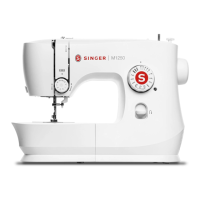A
B
C
43
1 2
English
11
Needles
The sewing machine needle plays an important role in successful sewing. Use only quality needles. We recommend needles of system
130/705H. The needle package included with your machine contains needles of the most frequently used sizes.
Be sure to match the needle to the thread you are using. Heavier threads require a needle with a larger needle eye. If the
needle eye is too small for the thread the needle threader may not work properly.
Note: To avoid the needle break, use only medium/low speed and recommended needle on thick fabrics works.
Change the needle often. As a general rule, needles
should be changed every 6-8 hours of actual stitch-
ing time.
Important Needle Information
Always use a straight needle with a sharp point and make sure
the point is not bent or damaged (A).
A damaged needle (B) can cause skipped stitches, breakage or
snapping of the thread. It can also damage the needle plate.
Do not use asymmetrical twin needles (C), they can damage
your sewing machine.
Note: Before you begin changing the needle, it can be helpful
to place a small piece of paper or fabric underneath the needle
area, over the hole in the needle plate, so that the needle doesn't
accidentally fall down into the machine.
1. Loosen the needle clamp screw. If it feels tight, use the
screwdriver from your accessories to aid with loosening the
screw.
2. Remove the needle.
3. Push the new needle upwards into the needle clamp with
the at side of the needle away from you.
4. When the needle will go up no further, tighten the screw
securely.
Change the Needle
Selection Guide — Needle Size, Fabric, Thread
Needle Size Fabric
70 (9)
80 (12)
Lightweight fabrics: Fine cotton, voile, silk, muslin,
interlock, tricot, jersey, crepe, polyester, chion, organza,
organdy
Light duty all-purpose thread
80 (12)
90 (14)
Medium weight fabrics: Quilting cotton, satin, double
knit, lightweight wool, rayon, polyester, lightweight linen
Use polyester threads on synthetic fabrics and
all-purpose or cotton thread on natural fabrics for
best results.
90 (14) Medium weight fabrics: Firm woven, medium weight lin-
en, cotton/polyester blend, terrycloth, chambray, double
knit
100 (16) Heavy weight fabrics: Canvas, wool, denim, home decor,
eece, heavy knit
Polyester or all-purpose thread.
110 (18) Heavy weight fabrics: Coat weight wool, upholstery
fabrics
Heavy duty thread for needle, with all-purpose
thread for the bobbin.

